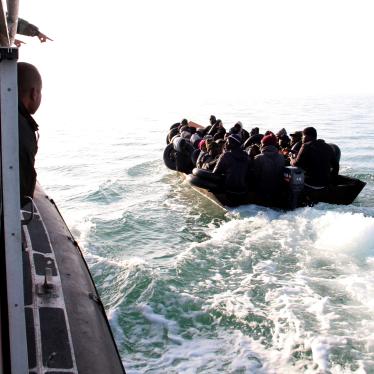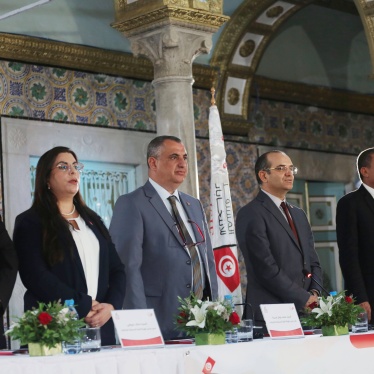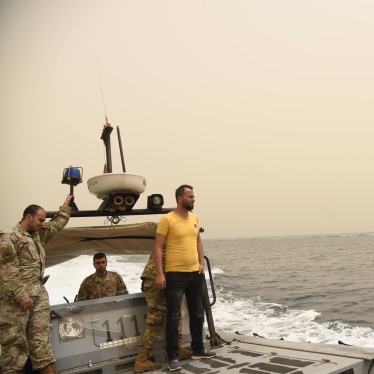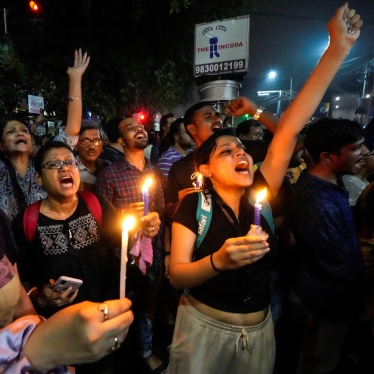Outline
2. Recommendations for the Partnership Agreements Negotiations
a. Human rights impact assessment
b. Ratification of International Conventions
c. Participation of Independent Civil Society in Monitoring the Agreements
d. Ensuring impact-focused human rights dialogues
e. Labor rights
3. Recommendations for a Benchmarks Approach to Progress on Negotiations and ratification
Background Analysis
Human Rights Watch (HRW) regrets that only 4000 characters are available for these consultations on 6 different GCC countries and agreements.
The negotiations for bilateral partnership agreements (PAs) are launched amid a strong, protracted reluctance from the EU to meaningfully address human rights abuses in GCC countries.
Human Rights Watch has documented systematic human rights violations against migrant workers in all six GCC countries. Under the kafala (sponsorship) system throughout the region, migrant workers’ visas are tied to their employers, leaving workers vulnerable to wage abuse, employer exploitation, and situations that amount to forced labor.
Systemic labor violations are effectively state policy in the Gulf countries and are deeply entrenched within the economies of the region. The increased trade promised by an agreement could facilitate the abuses even further.
Repression of dissent has also been intensifying in some GCC countries.
In an April 2022 letter, HRW recommended to the EU a “more for more” approach for its relations with the Gulf, linking closer ties with GCC countries to concrete human rights progress. HRW continues to encourage that approach, and notes that par. 8 of the June 20, 2022 Council conclusions stresses that “[p]ositive and constructive developments with regards to human rights and democratisation would also serve to further strengthen the potential for enhanced cooperation between the EU and the GCC countries”.
Regrettably, EU action to address human rights abuses in GCC countries remains limited.
EU public statements of concern are only issued on death penalty cases, hardly ever on issues related to labor abuses or repression of dissent. The EU’s reluctance to highlight human rights concerns on GCC countries is also palpable in the Commission’s 2022 joint communication for a strategic partnership with the Gulf.. Bilateral human rights dialogues have largely proven unable to secure tangible deliverables, such as the release of human rights defenders or the repeal of abusive laws and policies. No GCC individuals or entities are under EU human rights sanctions. GCC countries are rarely mentioned in EU statements at the UN Human Rights Council, and often with language that does not reflect the seriousness of the abuses.
Horizontal Recommendations for the Text of the Partnership Agreements
a. Human Rights Impact Assessment
There should be an independent human rights impact assessment before any agreement is signed. It should consider how an agreement would affect people in both the Gulf countries and the EU, particularly those marginalized such as women, migrant workers, LGBT people and children, and the ability of both the EU and the Gulf countries to fulfill their human rights obligations. Relevant stakeholders should be consulted during the assessment, particularly marginalized people and groups.
b. Ratification of international Conventions
Each agreement should require both parties, including all EU states, to ratify and maintain ratification of core human rights, labor rights and environmental treaties, including:
- The International Covenant on Civil and Political Rights (ICCPR), the International Covenant on Economic, Social and Cultural Rights (ICESCR), and other relevant international human rights instruments. In the GCC, only Bahrain, Kuwait and Qatar have ratified both, but implementation and compliance is lacking.
- The International Convention on the Protection of the Rights of All Migrant Workers and Members of Their Families. No GCC nor EU country has ratified it; and
- The ILO’s conventions on Freedom of Association and Protection of the Right to Organise, and the Right to Organise and Collective Bargaining. In the GCC, only Kuwait has ratified it.
c. Participation of Independent Civil Society
Each agreement should set up safe and formal platforms for dialogue between independent civil society groups and governments/institutions from both sides, including human rights groups and experts. Safeguards should be in place to protect them from, and react to, retaliation.
The agreement should also aim to facilitate independent visits to GCC countries by independent rights monitors.
d. Ensure Impact-focused Human Rights Dialogues
Human rights dialogues with GCC countries should be formalized and held annually. They should aim at securing concrete human rights progress and deliverables, such as the release of unlawfully detained prisoners, the end of abusive policies and the reform or repeal of laws that contradict international human rights standards. The press releases at the end of the dialogues should not be a mere repetition of the agenda of discussions, but should identify specific concerns, specific calls formulated and specific commitments.
Progress, or lack thereof, should inform the broader EU bilateral relations with the country concerned.
Human rights discussions should not be relegated to the yearly dialogues alone, but should be an integral part of discussions also during summits and other high-level interactions between EU and GCC members officials.
e. Labor Rights
Negotiations should aim at including specific and time bound obligations for concerned GCC countries to:
- Fully dismantle the “kafala” (sponsorship) system;
- Guarantee to all workers, including migrant workers, the right to free expression and assembly, collective bargaining, and the right to peacefully strike, and provide access to human rights groups to monitor the situation of migrant workers;
- The adoption and enforcement of legislation as necessary to ensure adequate heat protection for outdoor workers.
Benchmarks Approach for Progress in Negotiations and Ratification
HRW continues to recommend a “more for more” approach, linking progress on and the eventual ratification of partnership agreements to specific benchmarks on human rights progress in GCC countries. Such benchmarks could include:
- Labor rights: GCC countries should dismantle the “afala system” and increase essential protections for migrant workers (including climate-related extreme heat risks;
- Male guardianship: GCC governments should amend personal status and other laws to guarantee women’s rights, and ensure that the rights of women are respected in practice.
- Release of human rights defenders, government critics: authorities in the GCC should immediately and unconditionally release arbitrarily detained activists and human rights defenders, and commit to upholding civil and political rights.
- Reform of laws criminalizing dissent: GCC authorities should amend and bring in line with international standards abusive laws such as penal codes, Cybercrime Laws, and counter terrorism laws, which contain abusive provisions criminalizing freedom of speech, assembly association and other basic rights. All EU states should also ensure respect for freedoms of expression and of association and of the right to protest.
- Authorities in the GCC should end support for abusive forces operating beyond their borders and, when appropriate, should take effective action to stop the provision of weapons to warrying parties in Sudan in violation of the existing UN Security Council arms embargo on Darfur. EU states should likewise suspend all transfers of arms and military support to abusive forces operating beyond their borders.
Human Rights Watch stands ready to remain engaged in the process and provide country-specific recommendations that the limited space available in these consultations does not allow.








